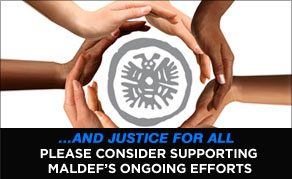FEDERAL COURT BLOCKS MOST OF SOUTH CAROLINA'S ANTI-IMMIGRANT LAW
Court Recognizes Law's Harms; Sets Narrow Limits on Police Conduct
CHARLESTON, S.C. – A federal court today blocked key provisions of South Carolina's anti-immigrant law and recognized that harms could take place if police officers check people's immigration status, inviting additional challenges of civil rights abuses.
Today's ruling reaffirms a December 2011 ruling that blocked key sections of the law, including those that aimed to turn unlawful presence into a state crime, and to make everyday activities such as giving a ride or renting an apartment to an undocumented immigrant into a crime. While today's decision by the U.S. District Court for the District of South Carolina in Charleston leaves room for implementation of a "show me your papers" provision, it invites future challenges involving lengthy detentions and other civil rights issues.
The district court issued this latest decision in order to ensure that its prior December ruling was in line with the guidance provided by the U.S. Supreme Court in June in a case regarding Arizona's anti-immigrant law, SB 1070.
MALDEF National Senior Counsel, Victor Viramontes, said: "The District Court blocked much of South Carolina's anti-immigrant law, but allowed local law enforcement to racially profile Latinos based on 'looking undocumented', which is destructive to the community and bad law enforcement. MALDEF will closely watch any attempts by local law enforcement to enforce South Carolina's law, while we continue our legal challenge to this discriminatory law."
Andre Segura, staff attorney with the ACLU Immigrants' Rights Project, said, "Today's decision follows a string of rulings in South Carolina and other states that have dealt a blow to state anti-immigrant laws by blocking most parts from going into effect. The court reaffirmed that it would be unconstitutional for state and local officers to detain individuals on the basis of their status alone, and left open the door to future challenges involving civil rights abuses under this law. We will continue to closely monitor the law's enforcement in order to ensure people's basic rights are protected."
Karen Tumlin, managing attorney for the National Immigration Law Center said, "The district court rightly recognized that South Carolina cannot disregard the federal government and the Constitution by turning everyday activities, and mere existence in the state, into a crime. Unfortunately, the court failed to recognize that the provision forcing police to demand "papers" of those they suspect are in the country without authorization will cause real harm to South Carolinians of all colors. Our fight against this pernicious provision will continue."
Mary Bauer, legal director of the SPLC, said, "Today's ruling sends a message that South Carolinians will not be criminalized for being good neighbors and that targeting people based solely on their race will not be tolerated," said Mary Bauer, legal director for the SPLC. "We are pleased that the court blocked some of the most harmful provisions of the state's anti-immigrant law. We will remain vigilant during this critical time when the ‘papers please' provision is implemented and we are prepared to do whatever it takes ensure no hateful or unconstitutional law is allowed to stand."
In addition to MALDEF, the ACLU, the ACLU of South Carolina, NILC, and SPLC, the coalition includes the South Carolina Appleseed Legal Justice Center, LatinoJustice PRLDF, Lloyd Law Firm, and Rosen, Rosen & Hagood. Members of the coalition have also filed lawsuits against state anti-immigrant laws in Arizona, Alabama, Georgia, Utah and Indiana. Courts have blocked major portions of these laws. In Alabama and Georgia, the U.S. Court for the Appeals for the 11th Circuit also recently blocked the transporting and harboring provisions.
For a copy of the decision: CLICK HERE

Founded in 1968, MALDEF is the nation's leading Latino legal civil rights organization. Often described as the "law firm of the Latino community," MALDEF promotes social change through advocacy, communications, community education, and litigation in the areas of education, employment, immigrant rights, and political access. For more information on MALDEF, please visit: www.maldef.org.
